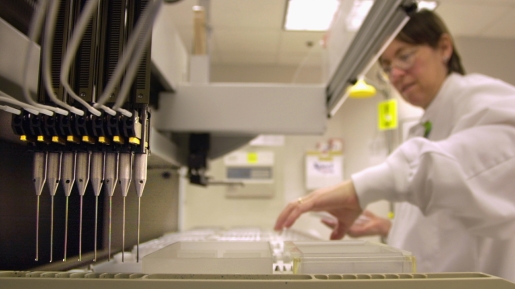
Myriad Genetics’ lab in Salt Lake City, Utah.
The patenting of DNA and other genetic material is really controversial. After all, it’s something that occurs in nature, so how could it be patented as if it were some company’s discovery? Well, medical company Myriad Genetics tried to patent the breast cancer gene, kicking off a very controversial court case that fought its way up the ladder and ended up in the lap of the Supreme Court itself. According to the highest court in the land, Myriad Genetics cannot patent the breast cancer gene itself.
As a result of the Supreme Court’s ruling, more companies are expected to create tests for the breast cancer and ovarian cancer genes. Myriad’s current test, the BRACAnalysis, tests for the BRCA1 and BRCA2 genes, which are linked to a higher risk of breast and ovarian cancer. That’s the test Angelina Jolie had that made her get a double mastectomy. The court ruled that natural DNA could not be patented, but man-made DNA (complimentary DNA or cDNA) could be patented.
“We believe the Court appropriately upheld our claims on cDNA, and underscored the patent eligibility of our method claims, ensuring strong intellectual property protection for our BRACAnalysis test moving forward,” said Myriad’s CEO, Peter D. Meldrum. “More than 250,000 patients rely upon our BRACAnalysis test annually, and we remain focused on saving and improving peoples’ lives and lowering overall healthcare costs.”
Tags: myriad genetics, supreme court, law and order, patent law, genetic law, genes cannot be patented, human dna cannot be patented, dna, peter d. meldrum, cdna, complimentary dna, brca1, brca2, breast cancer gene, breast cancer gene patent, supreme court strikes down breast cancer gene patent, bracanalysis, complimentary DNA, salt lake city, utah







